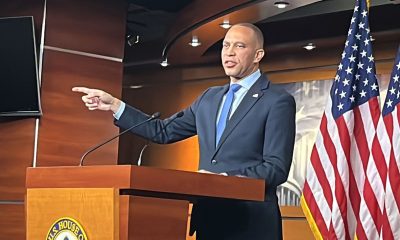Economics
Congressional Black Caucus Takes Tech Initiative to Silicon Valley
Congressional Black Caucus (CBC) Chairman G. K. Butterfield (NC-01), Rep. Barbara Lee (CA-13) and Rep. Hakeem Jeffries (NY-08), all members of the CBC Diversity Task Force visited Silicon Valley this week, Aug. 2-4, to meet with executives at the country’s foremost technology companies and organizations as part of the CBC TECH 2020 initiative.
<p><p><p>
Launched in May, CBC TECH 2020 is a five-year plan developed by the CBC to address the underrepresentation of African Americans within the technology industry.
“Our goal for this trip is to encourage and partner with these organizations to implement a diversity plan that will place more African Americans in the tech pipeline,” said Rep. Butterfield.
“This will potentially lead to a wide range of opportunities, from student internships to positions on the boards of tech companies,” he said. “Building a coalition of leaders from the public and private sectors ensures greater diversity and full representation of African Americans at every level of tech by 2020.”
“This visit is another step toward opening doors of opportunity for African Americans in the booming tech sector,” said Congresswoman Lee. “Increasing diversity and inclusion within the tech sector is not only a moral imperative, it is good for business and vital to continue economic growth.”
“The technology sector will increasingly be at the forefront of our country’s continued growth and prosperity,” said Rep. Jeffries. “In this regard, it is important to make sure that all Americans have an opportunity to participate in the innovation economy.”
As part of the TECH 2020 plan, the CBC has outlined diversity principles, best practices, and resources for African American students and entrepreneurs and introduced legislation focused on increasing STEAM education.
During the trip, members will a number of companies, including Apple, Bloomberg, Google, Intel, Kapor, Pandora and SAP.
Bloomberg hosted a press conference at its San Francisco office to discuss the CBC’s technology initiatives and the delegation’s work in Silicon Valley.
Judith Williams, Global Diversity and Inclusion Programs Manager represented Google. She said that Google has a robust K-12 investment in early education. Google hopes to rectify four factors that hold people back from reaching their potential.
“There is no encouragement in the work place. No one there looks like them. They don’t think they can succeed, and they don’t think they can change the world,” Williams said.
Congressman Butterfield said, “The current focus in Congress is for less education, and a push to shift the responsibility for education to the states. There is less money,” he said.
“We are fighting the same battles we fought before. We must make sure that the ‘unconscious biases’ don’t become institutionalized in organizations,” said Congresswoman Lee.
Activism
Oakland Post: Week of December 31, 2025 – January 6, 2026
The printed Weekly Edition of the Oakland Post: Week of – December 31, 2025 – January 6, 2026

To enlarge your view of this issue, use the slider, magnifying glass icon or full page icon in the lower right corner of the browser window.
Activism
Oakland Post: Week of December 24 – 30, 2025
The printed Weekly Edition of the Oakland Post: Week of – December 24 – 30, 2025

To enlarge your view of this issue, use the slider, magnifying glass icon or full page icon in the lower right corner of the browser window.
Activism
Oakland Post: Week of December 17 – 23, 2025
The printed Weekly Edition of the Oakland Post: Week of – December 17 – 23, 2025

To enlarge your view of this issue, use the slider, magnifying glass icon or full page icon in the lower right corner of the browser window.
-

 Activism4 weeks ago
Activism4 weeks agoDesmond Gumbs — Visionary Founder, Mentor, and Builder of Opportunity
-

 Activism4 weeks ago
Activism4 weeks agoFamilies Across the U.S. Are Facing an ‘Affordability Crisis,’ Says United Way Bay Area
-

 Alameda County4 weeks ago
Alameda County4 weeks agoOakland Council Expands Citywide Security Cameras Despite Major Opposition
-

 Alameda County4 weeks ago
Alameda County4 weeks agoBling It On: Holiday Lights Brighten Dark Nights All Around the Bay
-

 Activism4 weeks ago
Activism4 weeks agoBlack Arts Movement Business District Named New Cultural District in California
-

 Activism4 weeks ago
Activism4 weeks agoOakland Post: Week of December 17 – 23, 2025
-

 Activism4 weeks ago
Activism4 weeks agoLu Lu’s House is Not Just Toying Around with the Community
-

 Activism3 weeks ago
Activism3 weeks agoFirst 5 Alameda County Distributes Over $8 Million in First Wave of Critical Relief Funds for Historically Underpaid Caregivers


















































